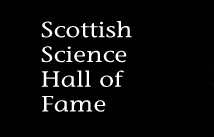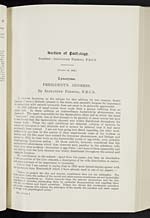Alexander Fleming (1881-1955)
Lysozyme: President's address
Section of Pathology.
President—ALEXANDER FLEMING, F.R.C.S.
___________
[October 18, 1932.]
Lysozyme.
PRESIDENT’S ADDRESS.
By ALEXANDER FLEMING, F.R.C.S.
I CHOOSE lysozyme as the subject for this address for two reasons, firstly
because I have a fatherly interest in the name, and, secondly, because its importance
in connection with natural immunity does not seem to be generally appreciated.
In 1921 cultures of nasal mucus were made from a person suffering from an
acute cold. In these cultures an extraordinary bacteriolytic phenomenon was
observed. The agent responsible for the bacteriolytic effect and to which the name
“lysozyme” was given, was at first thought to be peculiar to nasal mucus but soon
it was found that the bacteriolytic element was widely distributed throughout the
human body. When the right conditions are obtained, solution of bacteria by
means of lysozyme is very dramatic and it cannot be believed that it had never
previously been noticed. I am not here going into detail regarding the older work.
Suffice it to say that by the nature of their experiments some of the workers on
leukins and the like must have noticed the lysozyme phenomenon, and Rettger and
Sperry in 1912, in their work on the bactericidal power of egg-white, were probably
investigating lysozyme action. All these authors, however, considered that the
antibacterial phenomena which they observed were peculiar to the substance with
which they were working—leucocytes or egg-white—and none of them apparently had
any inkling that the lytic element was widely distributed throughout the animal and
vegetable kingdom.
My contribution to the subject—apart from the name—has been an elucidation
of the properties of the lytic element, a description of its wide distribution in nature,
and some estimate of its importance in immunity.
I think that I am correct in saying that in 1921 most bacteriologists agreed with
the quotation from Metchnikoff which I have already used in one of my papers:—
“Nature, to protect the skin and mucous membranes does not use antiseptics. The
fluids which bathe the surface of the mouth and other mucous membranes are not bactericidal
or only very imperfectly so. Nature removes from the mucous membranes and the skin
quantities of microbes, eliminating them by epithelial desquamations and expelling them
with the secretions and liquid excretions. Nature has chosen this mechanical procedure
just as the surgeons who replace the antisepsis of the mouth, the intestine and other organs
by lavage with physiological saline.”
DEC. – PATH. 1


